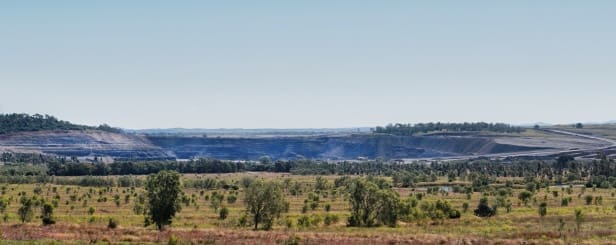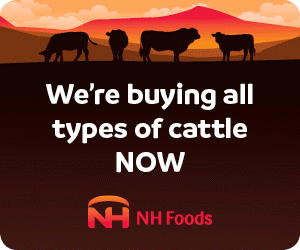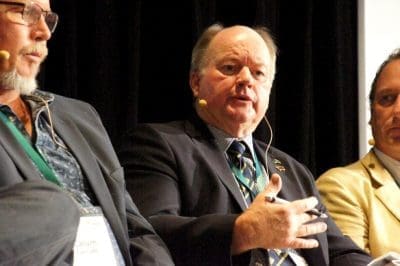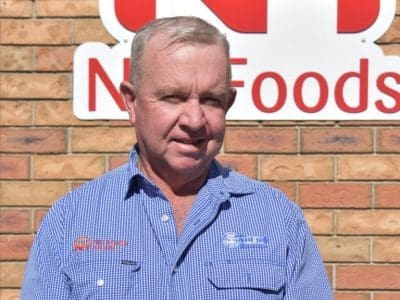
Several large beef processors in South East Queensland are facing significant impacts as a result of Queensland Government indecision over the future of the New Acland coal mine near Oakey. Picture: New Hope Group.
SOME of Queensland’s largest beef processors and cattle lot feeders are bracing for major impacts after learning their supply of coal will be cut off within nine months.
A large number of abattoirs and feedlots in Southern Queensland rely upon coal from the New Acland mine near Oakey to power boilers for steam generation, which is used for powering rendering cookers, sterilising equipment, cleaning and steam flaking stock feed.
 The New Acland Mine has been operating since 2002 and, in its current stage, will run out of coal by June 2020.
The New Acland Mine has been operating since 2002 and, in its current stage, will run out of coal by June 2020.
The New Hope Group which owns the mine has been locked in a 12 year battle to secure approval to develop Stage Three of New Acland, but has faced opposition and legal challenges from nearby landholders, residents and environmental groups concerned about groundwater impacts.
After a series of court cases the development remains in limbo as New Hope waits for the Queensland government to rule on a pending water licence.
Last month the company said the ongoing delays had left it with no choice but to make 150 workers redundant at the New Acland Mine.
Last week it began sending letters to customers, including several of Queensland’s largest beef processors, advising them they would no longer be able to receive coal from the site beyond June 2020.
‘We never thought it would get to this’
David Foote from Australian Country Choice, which operates a beef processing plant at Cannon Hill in Brisbane, said most beef processors in South East Queensland which use coal fired boilers have now received closure notices from Acland Mine.

David Foote
“We never thought it would get to this,” he told Beef Central.
“There is forecast to be another 25 to 30 years of coal at Acland but they are not going to be able to mine it by the look of it.
“We’ve all probably been in denial thinking this closure won’t happen, that this mine operation would be supported by the state government but we just got our cessation of supply letters last week.”
Pat Gleeson, General Manager of Oakey Beef Exports, said the looming wind-up will have a significant impact on affected processors, with the closest alternative supply of equivalent heat value domestic thermal coal being at either Clermont in Central Queensland or Kempsey in NSW, but at much higher cartage costs.

Pat Gleeson
“If you look across production, this is just another impact we don’t need and we shouldn’t have,” he said.
“If the State Government was proactive, this should not have dragged on as long as it has.
“You’d be surprised the number of businesses. in the beef trade this will effect, this will have a far greater effect than what people actually think.”
Switching to boilers powered by other energy sources such as gas would require major capital investments, a long development time, while gas supply was subject to long-term contracts and maximum daily allowances.
The loss of coal from Acland would also undermine the efficiency and viability of the western rail line which the Southern Queensland cattle industry is trying to revitalise.
It is likely the higher costs of energy required to power boilers in future will ultimately be borne by everyone in the supply chain, from cattle producers through the purchase price of cattle through to consumers paying more at the checkout.
Other businesses likely to be impacted by the impending loss of access to New Acland coal include South East Queensland’s major hospitals and manufacturing businesses.
Beef Central understands that an alliance of affected beef processors will be meeting with the Queensland Government to communicate the severity of the looming impacts in coming weeks.

Put in a small nuclear plant.
Never underestimate the resolve and tenacity of the “greens” to impose their warped values on society and shut you down.
I am astonished at the comment by David Foote that ‘We never thought it would get to this’! Thermal coal has been a major issue in the global heating crisis for many years now, and has permanently destroyed huge areas of otherwise viable gazing land, and destroyed groundwater and surface water flows, all of which are essential to the very commodity the industry deals in – cattle. Many rural industries and farms, even rural towns here in north Queensland, have converted to solar and wind, with battery backup to avoid the high costs of carting diesel, coal and gas and of course reduce emissions. Numerous other alternatives are also being developed right now, such as pumped hydro. So where has this part of the industry been? National Farmers Foundation and Farmers for Climate Action have recognized that these are issues that are urgent and must be addressed, by graziers and farmers, and by the rest of the community.
Noel,
I have to suggest that you are dreaming if you are of the opinion that “renewable energy” can replace coal as a source of energy.
Unfortunately coal is required in the manufacture of the components of the “renewable energy” components, not to mention the huge amounts of concrete that is used in the foundations of the pylons that support wind turbines
How do you make the heat sufficiently hot to produce enough steam to run a rendering plant with solar and batteries Noel. The reason they use thermal coal is that it is can generate sufficient heat to run the plant. Is your life totally supported by renewable energy? Solar and batteries or are you connected to the grid and is your car 100% solar powered? or is it powered by fossil fuels. Petrol or Diesel.
Fair question Doug.
Perhaps you could ask Asia-Pacific Agri-Corp (http://apacificprojects.com/) how they are going to run their whole beef processing enterprise at Gladstone in the next couple of years. Indeed, Beef Central publicised it last September.
Or perhaps you could ask the developers of the Aldoga Beef processing facility, Saunders Havill Group (https://www.saundershavill.com/aldoga-abattoir-facility-and-solar-farm-approved/).
And JBS are installing solar on their facilities, such as in NSW at Andrews Meat, to reduce their energy costs.
I’m sure they have worked it out.
But my comment was as much about not being prepared for the eventuality of reduced coal supplies. They surely should have been investigating and planning better energy options.
And yes, I have installed roof-top solar – two systems that run my water for cattle, power my shed and houses, and power my electric fences to contain my cattle in grazing cells. It works well when the sun shines, so I maintained connection to the grid to use the grid power when the sun ain’t shining and then pump power back into the grid when it is. Batteries next when the technology and prices match my budget.